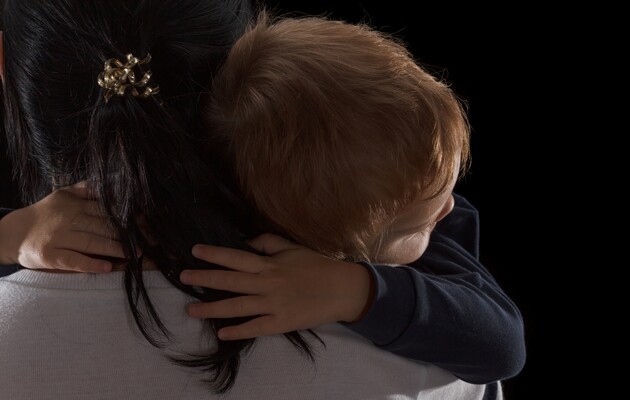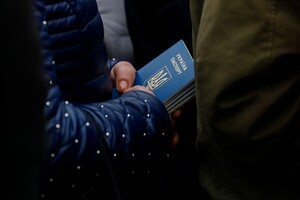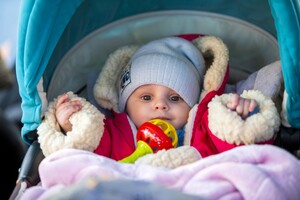Hunting or caring? The court returned the child of the Ukrainian woman who was taken away by the French social services
As it became known from 18-year-old Ukrainian Liudmyla Koltunovska, who is in the city of Évreux (in Normandy, France) and has temporary protection status, had her newborn child (a girl) taken away by the social service right in the maternity hospital and transferred to a foster family. The official reason for this decision was something like this: “The mother is indifferent to the child.” The Ukrainian Embassy in France, the Ministry of Justice, and Ukrainian volunteers joined the fight for family reunification. We prepared documents justifying the illegality of the actions of social services in relation to Koltunovska.
On December 11, a court hearing took place, which was held behind closed doors. Neither the Ukrainian consul Serhii Yesaulov, nor other representatives of the embassy and volunteers, nor the Ukrainian lawyer named Maryna Semenova were allowed to attend the meeting. Lyudmila's interests were represented by the French lawyer named S. Dunikovski. Court verdict: return the child to his parents with continued counseling support. Next are the details.
In a commentary to ZN.UA, lawyer Maryna Semenova explained that Liudmyla Koltunovska is from Korosten, Zhytomyr region, and the child’s father is an Afghan migrant. Liudmyla lives in the same dormitory provided for Ukrainians with temporary protected status. The child’s father is in another place, since he has no right to live in the same dormitory. He works and is able to provide financially for his daughter. Currently, Lyudmila lives on financial assistance from the state. The financial assistance is sufficient, since accommodation and food are provided free of charge. Health insurance covers both the cost of medical services and the cost of medicines.
But here’s what’s interesting: as Maryna Semenova said, the case of Liudmyla Koltunovska is not an isolated one, in her legal practice there were similar cases – in Estonia, Denmark, Poland, Germany. Children are taken away from their parents under various pretexts or are not allowed to leave the EU.
“I cannot clearly name the reasons for this phenomenon, but, undoubtedly, it looks like Europe is interested in keeping Ukrainian children,” says the lawyer. – The most common reason for refusing to let a child leave the EU for Ukraine is war. This mainly concerns children who were taken to the EU after the start of the full-scale invasion.
As for children born to Ukrainian women who are in the EU with temporary protection status, in informal communication, lawyers say that this is the third case of children being taken away from their mothers directly in maternity hospitals.”
As our interlocutor said, martial law is not always the reason for refusing to return a child to Ukraine. For example, during the consideration by an Estonian court of a case on the return of a child to Ukraine, the court came to the conclusion that the very removal of a child from its place of residence in Ukraine without the consent of the child’s father was unlawful within the meaning of Article 3 of the 1980 Hague Convention.
However, the court refused to return the child to the father, since several criminal proceedings were opened against the mother in Ukraine under Article 126-1 of the Criminal Code of Ukraine – domestic violence against a child and its father. This, according to the court, is the basis “for the non-return of the child in in accordance with paragraph b of the first part of Article 13 of the Hague Convention.” Namely, we quote: “The court may refuse to return the child in a situation where the child’s mother cannot travel with this child due to criminal proceedings against her, opened at the request of the father. And if the child’s mother cannot return [to Ukraine], this will cause mental suffering for the child.” Thus, the child remained in Estonia with the mother, who illegally took the child away and against whom a pre-trial investigation is being conducted in Ukraine.
At this time, the whereabouts of the child are unknown. Estonia ignores requests from official authorized bodies of Ukraine. And to the father’s inquiries, a representative of the social service of the city of Rapla responds that he will not tell where and with whom the child is, and directly indicates that he prohibits the father from communicating and seeing him, which is a violation of international law, in particular the Convention on Personal Contact with Children.
“I had a client in Denmark,” continues Mrs. Marina. “In February of this year, she wanted to leave the EU for Ukraine with her child and was detained at the Ukrainian-Polish border. She was informed that she could go to Ukraine, but the child would be returned to Denmark, because, according to the competent EU authorities, the child’s place of permanent residence is Denmark. The woman was in custody for three or four days until we secured her release. While in Ukraine with her child, my client canceled the temporary protection status for herself and her daughter. However, for more than six months after this, the Danish court considered the issue of depriving my client of custody of the child. A rather absurd conflict arose: the plaintiffs tried to convince the court that the mother, a citizen of Ukraine, was trying to “illegally” take her daughter, also a citizen of Ukraine, out of Denmark. In court, we were able to prove that the dispute over issues of guardianship over a citizen of Ukraine who has temporary protection status is not within the jurisdiction of Denmark.
What is the main reason for such cases, why do Europeans need Ukrainian children? In informal communications, representatives of various authorities say that the reason is the desire of Europeans to refresh the gene pool, which has serious problems, and in general, Europeans do not want to have children. Therefore, Ukrainian children in Europe are very useful.
Let us note, however, that Ukraine, unfortunately, has problems that have been greatly aggravated by the large-scale war unleashed by Russia. At the same time, the Russian occupiers are deporting tens of thousands of Ukrainian children to the Russian Federation.
“For more than a year, I and my clients, who traveled abroad with their children and whose children, under various pretexts, the authorities of EU countries are trying to leave in these countries, have been saying that the problem is global and requires the intervention of the Ukrainian authorities. But, unfortunately, the authorities are trying to pretend that there is no problem. Maybe now, after the incident with Liudmyla Koltunovska and her newborn daughter, something will change,” says Maryna Semenova with hope.
It is worth noting that, on the one hand, taking children away from their parents, wherever they are, is an invasion of privacy. This is regulated by the European Convention for the Protection of Human Rights and Fundamental Freedoms. But if we see that, say, a foreign citizen is beating her child on the street, neither we, ordinary citizens, nor the police will indifferently watch what is happening and, of course, will intervene. So Ukrainian children are removed from their families both in Ukraine and in other countries if their life and health are threatened. After all, Ukraine, like Estonia, and many other countries of the world, are countries that have signed a number of international conventions, including the UN Convention on the rights of the child (UNCRC).
For the sake of justice, it is also worth noting that thousands of Ukrainian families with children return from EU countries to Ukraine, and no one is stopping them from this decision. But there is no doubt that many thousands, tens, hundreds of thousands of families will choose an EU country as their permanent place of residence, where they received temporary protection by sticking a work visa in their passport. Which, unfortunately, will be a very painful blow to the demography and economy of Ukraine. But this is a topic for another publication.
Read this article in Ukrainian and russian.
Please select it with the mouse and press Ctrl+Enter or Submit a bug















 Login with Google
Login with Google